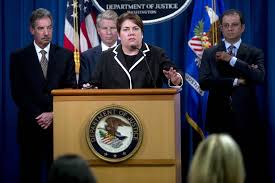Value of (Non-) Cooperation in FCPA Cases
 The Department of Justice has encouraged companies to voluntarily disclose potential FCPA violations and cooperate in the investigation, of FCPA violations. Many companies have responded positively to the Justice Department’s urgings and have been rewarded for their cooperation.
The Department of Justice has encouraged companies to voluntarily disclose potential FCPA violations and cooperate in the investigation, of FCPA violations. Many companies have responded positively to the Justice Department’s urgings and have been rewarded for their cooperation.
I have suggested that DOJ should adopt and publicize guidelines for how cooperation will be measured and specific discounts to be earned for levels of cooperation. US Attorneys around the country adopt general rules for calculating credits with flexibility to accommodate issues outside the norm. DOJ should do the same, especially in the FCPA area. The Antitrust Division has defined benefits for cooperation under its program. There is no reason that the Criminal Division to avoid the same.
DOJ claims they provide significant credits for voluntary disclosure and cooperation. In the words of Warner Wolf (who was originally a DC-legendary sportscaster before moving to NYC), “let’s go the videotape,” and see what the facts reveal. I reviewed DOJ FCPA settlements for the last two years, 2013 and 2014 to identify the amount of a discount given to those companies that cooperate.
I have to acknowledge important limitations on the inquiry. A company’s cooperation is one of several factors weighed by the Justice Department in reaching a settlement amount. Specifically, the Justice Department has cited such factors as the timing of the company’s disclosure, the extent of remediation, the involvement of foreign law enforcement and prosecutions, the company’s agreement to plead guilty to a criminal offense, and other issues as “relevant considerations” underlying the Justice Department’s ultimate resolution or recommendation.
Here is a chart of corporate resolutions and the cooperation discount.
| Company | Sentencing Range (millions) | Cooperation | Fine (millions) | Discount/Penalty (millions) |
| Alstom | $532-1065 | None | $772 | +$240 |
| Avon | $84-169 | “cooperation” | $67 | -$17 (20%) |
| Dallas Airmotive | $17.5-$35 | “substantial cooperation” | $14 | -$3.5 (25%) |
| Hewlett-Packard | $19.3-$38.6 | “cooperation” | $15.45 | -$3.85 (24%) |
| Marubeni | $63-127 | “refusal to cooperate” | $88 | +$25 |
| Alcoa | $446-$892 | “substantial cooperation” | $209 | -$237 (53%)* (DOJ cited undue burden of fine) |
| Archer Daniels | $27-$54 | “extensive cooperation” | $17 | -$10 (36%) |
| Bilfinger | $28-56 | “cooperation, albeit at a late date” | $32 | +$4 |
| Weatherford | $87-174 | “cooperation has been, on the whole, strong” | $87 | 0 |
| Diebold | $36-72 | “cooperated fully” | $25 | -$11 (30%) |
| Total | $235-470 | None | $245 | +$10 |
| Parker Drill | $14.7-29.4 | “cooperation” | $11.76 | -$3 (20%) |
Based on this cursory analysis, there are several general observations:
First, the cooperation discount from the bottom of the sentencing range can vary between 20 and 35 percent (and possibly more) depending on the quality of cooperation. DOJ has awarded significant discounts for “full” cooperation, “extensive” cooperation, and “substantial” cooperation. A singular “cooperation” can still earn a company a 20 percent discount from the bottom of the sentencing range.
Second, a company’s refusal to cooperate can lead to a substantial penalty, as demonstrated in the Alstom and Marubeni resolutions.
 It is important to remember all the caveats to this analysis given the number of factors that go into DOJ’s ultimate resolution.
It is important to remember all the caveats to this analysis given the number of factors that go into DOJ’s ultimate resolution.
My review, however, confirms what the Justice Department has been stating – if a company cooperates, it will earn significant benefits for doing so. The amount of such benefit can vary from between roughly 20 and 35 percent depending on a number of factors but if a company commits to cooperation early in an investigation there are significant benefits to reward its efforts.















